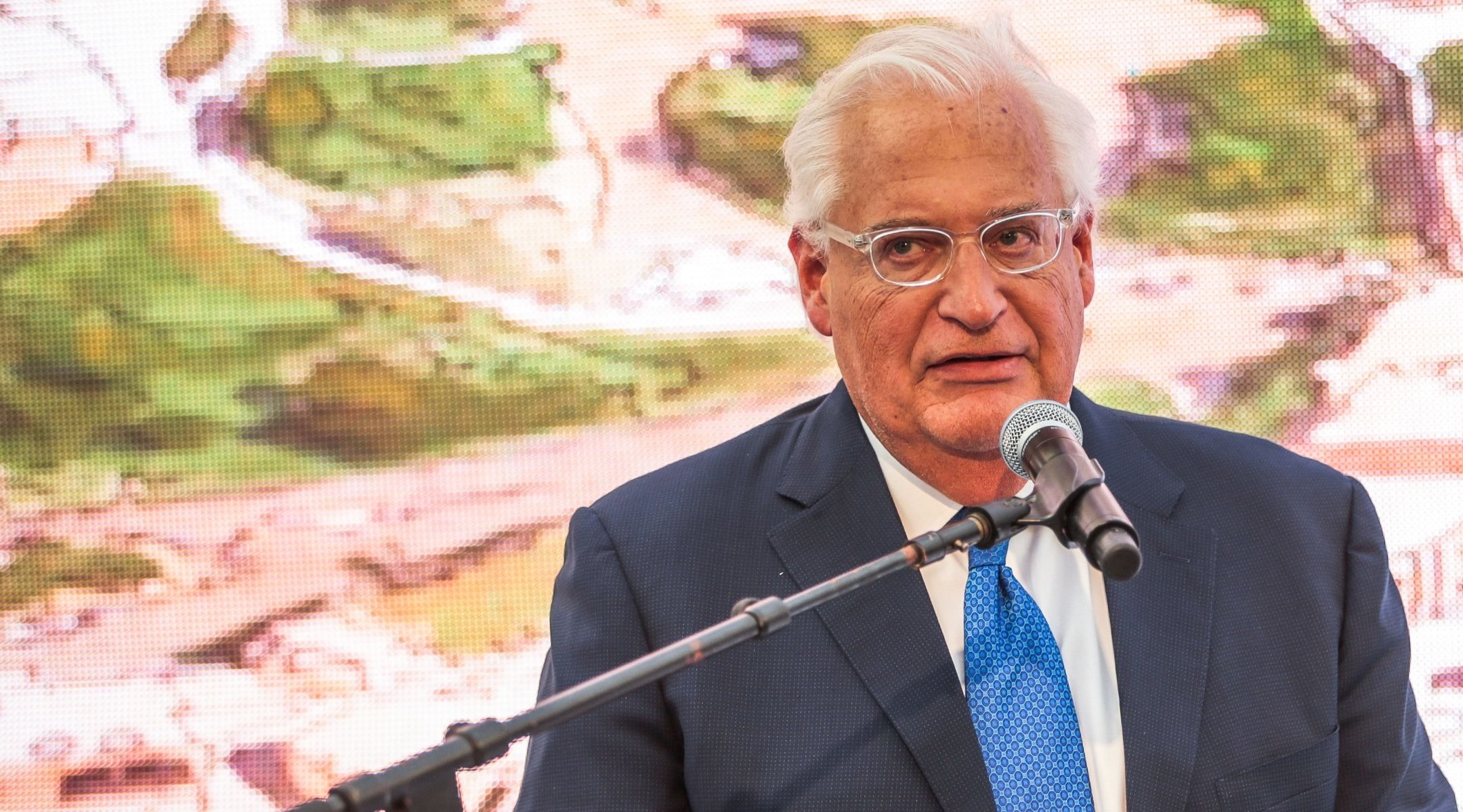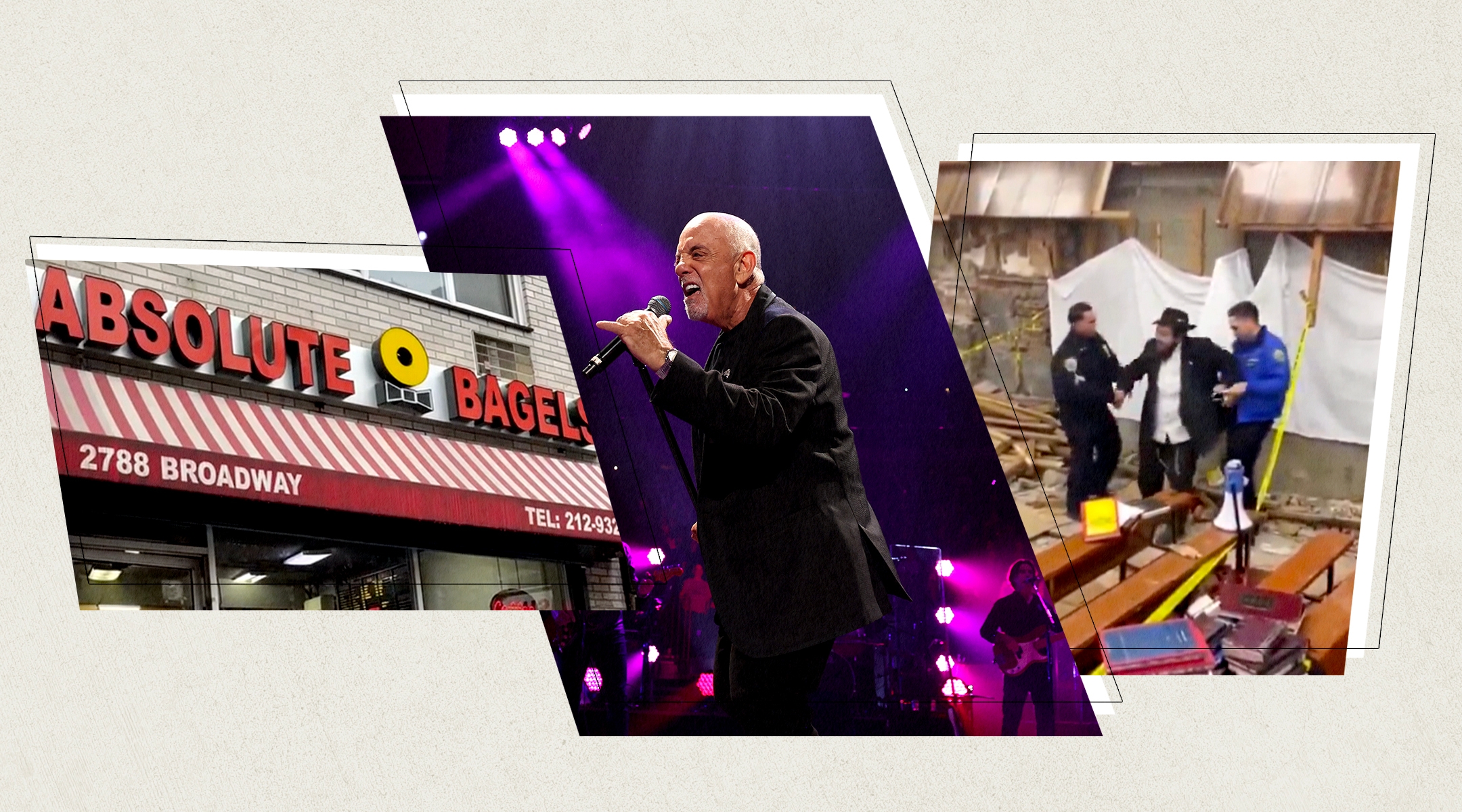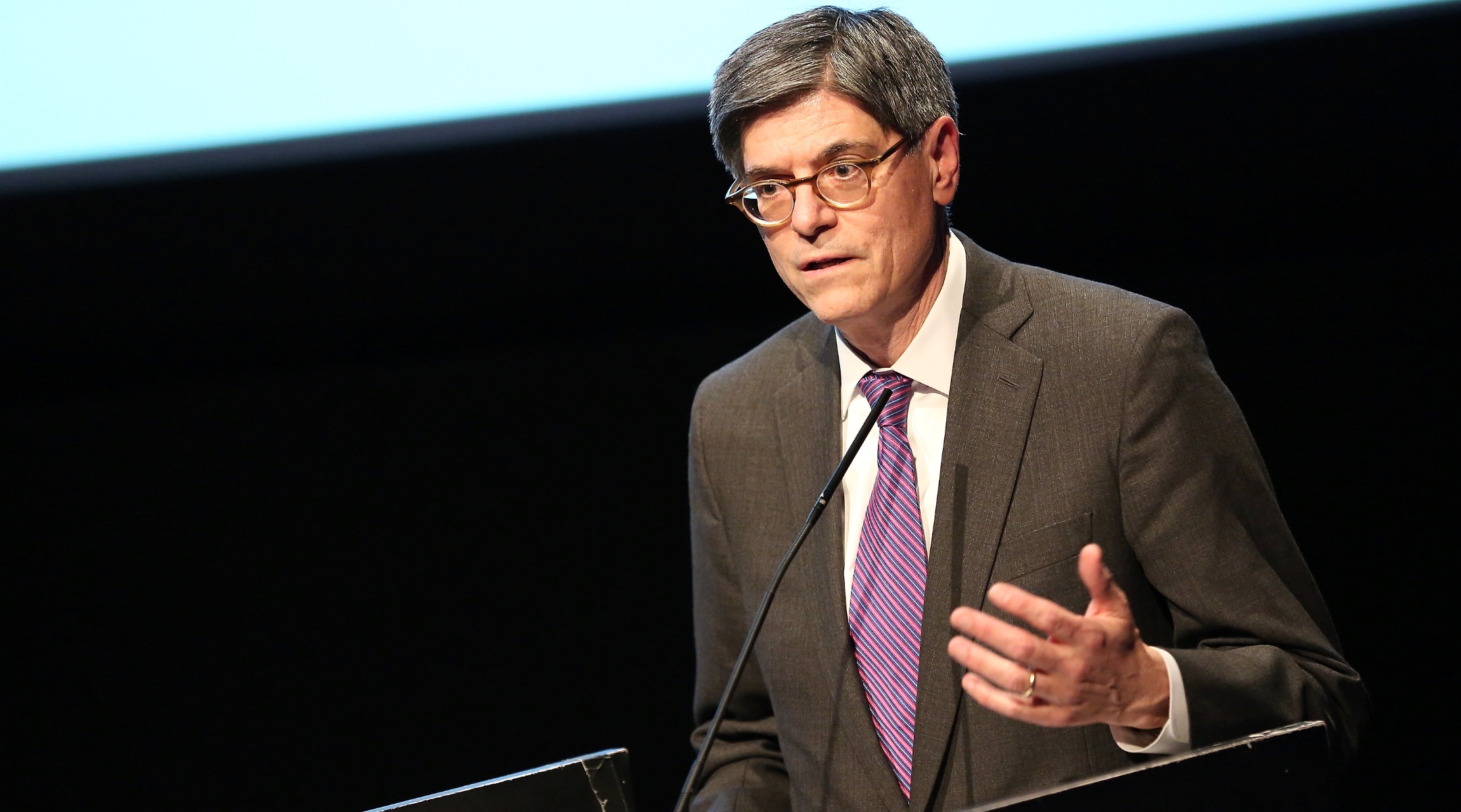Around the time he was preparing to release his new book earlier this year, David Friedman, the former U.S. ambassador to Israel under Donald Trump, was approached by an advocacy group that focuses on fostering support for Israel among Christians.
The group, known as Israel365, asked Friedman to support a slate of candidates in next year’s election for the World Zionist Congress, a longstanding yet obscure organization that gives Jews around the world direct influence over Israel’s governance.
Established by Theodor Herzl in 1897, the congress and its representatives from Jewish communities around the world allocate $1 billion to Jewish causes every year and oversee Israel’s so-called national institutions, including the World Zionist Organization, which carries out the congress’ vision; the Jewish Agency, which plays a central role in immigration to Israel; and the Jewish National Fund, which owns 13% of Israeli land.
Coming at a pivotal moment in Israeli history, the upcoming election is widely viewed as an important contest in the battle for the country’s uncertain future, with new slates forming on both the left and, in the case of the group that approached Friedman, on the right.
Friedman agreed to the group’s request to use the title of his book, “One Jewish State,” as the name of the slate, signifying their shared support for strengthening Israeli control over the West Bank and their opposition to the two-state solution.
But last week, after the slate had gathered enough signatures to make the ballot, Friedman took to social media to address the “confusion” that made some people think he was involved in the slate.
“To clarify, I am NOT affiliated with any slate or candidates seeking election and I have not authorized anyone to speak on my behalf,” Friedman wrote.
He concluded, using the Israeli government’s preferred term for the West Bank, “I believe that the World Zionist Congress should support the Jewish communities located in Judea and Samaria and I support the slates which share this view.”

U.S. Ambassador to Israel David Friedman speaks at the opening of Pilgrimage Road at the City of David archaeological site in the eastern Jerusalem neighborhood of Silwan, June 30, 2019. (Flash90)
Friedman’s post brought into public view an internal controversy, which has been marked by allegations that the slate had engaged in a bait-and-switch by using Friedman’s name to advance a hidden Christian agenda. Israel365, which denies the allegations, recently filed paperwork to change the slate’s name to Israel365 Action.
The controversy, which caused dozens of people to leave the slate, comes amid anxiety about Christian influence in an election that’s supposed to involve Jews only. With Israel’s government increasingly drawing its most reliable support Stateside from U.S. evangelicals, and with religious identity increasingly fluid, those who are tuned in early to the World Zionist Congress election say they fear non-Jews could cast ballots or otherwise shape the results in contravention of the election’s by-laws.
Such concerns have even prompted a change to the process for determining voter eligibility.
In the past, voters have had to state that they were Jewish and Zionist, criteria that exclude, for example, the tens of millions of Americans who identify as Christian Zionists. Now, voters will have to affirm that they are Zionist, Jewish, and that they “do not subscribe to another religion.”
Herbert Block, the executive director of the American Zionist Movement, which administers the election online in the United States, said the change was not prompted by the allegations against One Jewish State, but by a general desire to protect the integrity of the vote from people who may identify as Jews but should not be counted as such.
“Some members of our elections committee expressed concerns about Messianic Jews, or Jews for Jesus, or others voting,” Block said.
The coming election is shaping up to be hotly contested. At the deadline last month, nine new slates had gathered the requisite 800 signatures to register to run, on top of the 14 slates that have already existed since at least the last election in 2020. About 125,000 American Jews voted in 2020, out of the millions of American Jewish adults.
“There’s particular interest in the election — American Jews are more engaged with things related to Israel and Zionism, especially since the Oct. 7 attack,” Block said.
The slates represent different demographic groups, with variation by religious, ideological, and ethnic affiliation, but two major camps have emerged. On the left are those that support the two-state solution and a pluralistic Israel, and on the right are slates that want to bolster Israeli sovereignty in the West Bank and emphasize the country’s Jewish identity. Most of the new slates belong to the latter group.
Both sides are treating next year’s contest as a critical referendum on the soul of Israel, and they are battling over what’s seen as the biggest prize of the election: the American Jewish vote, which decides about one-third of the representatives in the congress. (The other two thirds are split between Israel, whose representation is predetermined according to the proportion of seats each party holds in the country’s parliament, and the rest of the world, which is difficult to fight over because of how widely Jewish communities are dispersed.)
Surveys show that American Jews favor the two-state solution and pluralism in Israel, but the question is, Which side will turn out to vote in greater numbers?
One of the people urging American Jews to vote is Yizhar Hess, the vice chairman of the World Zionist Organization, and the senior representative in the organization from the left-leaning Conservative movement of Judaism. He said he’s worried the religiously Orthodox and politically right-wing parts of American Jewry will be overrepresented — as they were after the last election — and add the large Israeli bloc that already leans that way.
“It would be a historic calamity to allow Zionism to be controlled by only one side of the religious and political map,” he said in an interview. “If it happens, I am worried about the future of Israel and Zionism. The involvement of the entire Diaspora in the shaping of Israel is more critical than ever before.”
The screening of voters is based on the honor system, with each voter asserting their eligibility. But Block said his group does spot checks and looks for patterns that could indicate cheating. He said he doesn’t expect to face a problem of ineligible voters.
Even if the eligibility change is just a precaution, it reflects a growing fluidity in religious identity in the United States, where a fifth of people now attend houses of worship that don’t match their stated religious affiliation.
Even more to the point, the number of people in the United States who say they are Jewish but are not considered as such by conventional standards is significant. The Pew Research Center in 2020 estimated that 1.4 million American adults who identify as Jewish do not have a Jewish parent and do not consider Judaism their religion, perhaps because they are married to a Jew or because they are Christians who associate Jesus with Judaism. That’s in addition to 200,000 people who say they practice Judaism and another religion.
Then there are those who are religiously invested in Israel’s future but are not Jewish at all: evangelicals. They are the target constituency of Israel365, the nonprofit running the slate formerly named for David Friedman’s book.
A former candidate for the slate, Tilly Feldman is among the most outspoken critics of Israel365 Action, which she has accused of being a “Christian slate.” She said so on social media in response to Friedman’s post on X, joining another former candidate, Seth Leitman, who also called it a “Christian slate.” Leitman, an environmental activist from suburban New York, wrote, “Folks, we got grifted off this amazing man’s vision.”
Several others made similar points in off-the-record interviews with the Jewish Telegraphic Agency.
Feldman, an activist for right-wing and pro-Israel groups in Los Angeles, told JTA she was thrilled to join an effort that appeared to be backed by Friedman. A video posted by Israel365 in July is titled, “Ambassador David Friedman endorses the One Jewish State party in the World Zionist Congress.”
What Friedman said in the 46-second clip can be interpreted in more than one way. He said he was flattered the slate chose to name itself after his book and cast the decision as an endorsement of his own efforts to start a movement. He then said, “I endorse their efforts.”
Feldman and others say the slate used clips like this to trick them into thinking Friedman had a formal role, and she complained to the AZM.
“I am writing to express my serious concerns regarding the slate One Jewish State and their misrepresentation of who they are and what they stand for,” Feldman wrote in the complaint, which she shared with JTA. “When I initially signed up, I believed, as did hundreds of others, that this slate was being led by ambassador David Friedman. This belief was central to their campaign and was a key reason so many delegates joined.”
She also urged people to defect from the slate. Dozens of people suddenly emailed AZM to withdraw their signatures, according to Block. (Even with the defections, Block said, the slate had more than enough signatures to register.)
In an email to JTA, Rabbi Tuly Weisz, the founder of Israel365, rejected the allegation and said the slate’s leadership had never misstated its relationship with Friedman.
“Since the war broke out, we have been working closely with him on behalf of Judea and Samaria,” Weisz wrote. “In the summer, we discussed with Ambassador Friedman calling our party ‘One Jewish State’ which at the time seemed like a great idea since his book was coming out a few weeks later, and he enthusiastically endorsed our slate. In the subsequent weeks, there was some confusion since his book and our movement were separate entities, so we decided to change our name to Israel365 Action.”
With the name change has come a shift in the slate’s platform. In the platform submitted to election officials months ago, the language hews closely to the principles found in Friedman’s “One Jewish State” book. But the slate’s new website contains additional language with a focus on the relationship between Israel and its Christian allies.
“Israel365 Action will direct resources towards engaging and educating the younger generation of Christians, thus ensuring that strong Christian support for Israel will continue into the future,” the website says.
Feldman said she would never have supported the slate to begin with if that were its platform.
“This is completely contrary to what many of us signed up for,” she wrote in her complaint. “It has left me, and others, feeling deceived and disillusioned by their lack of transparency and honesty.”
In his email, Weisz said that Israel365’s work with Christians is longstanding and well-known and that it was not concealed during the effort to gather signatures. He also said that the group, which counts many Christian followers, has taken care to communicate that only Jews are allowed to vote.
“For 13 years, Israel365 has carefully built bridges and nurtured relationships between Zionist Jews and Christians,” he wrote. “We hope that when Israel365 Action gets a seat at the Zionist table, we can help forge even stronger relationships between the Jewish community and our tens of millions of non-Jewish allies and thereby transform Israel into a ‘light unto the nations’ and the most beloved country in the world.”
Election officials do not plan on taking action in response to the complaints.
“I know they had some internal differences,” Block told JTA. “Every slate has its own internal issues and, unless something is a violation of some rule, then that’s not in our purview.”
Support the Jewish Telegraphic Agency

Help ensure Jewish news remains accessible to all. Your donation to the Jewish Telegraphic Agency powers the trusted journalism that has connected Jewish communities worldwide for more than 100 years. With your help, JTA can continue to deliver vital news and insights. Donate today.









 English (US) ·
English (US) ·